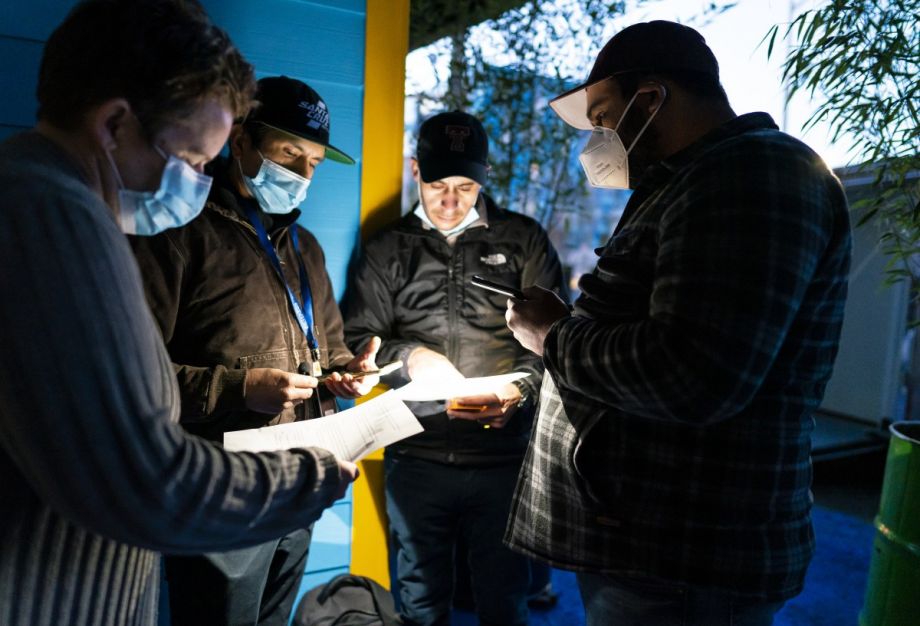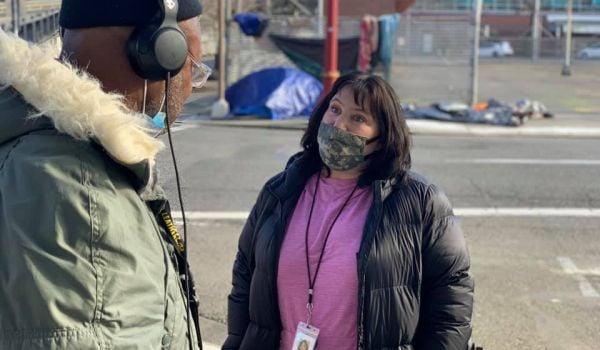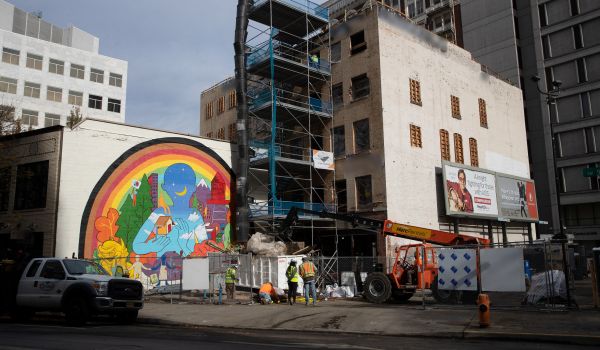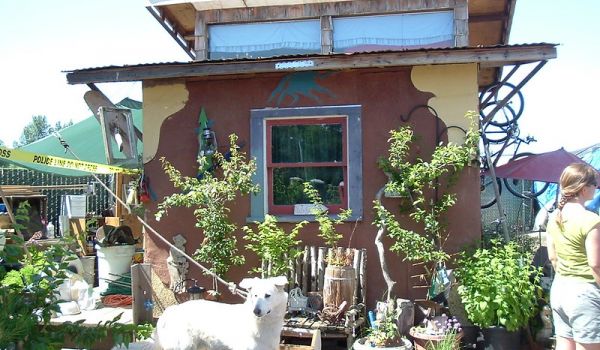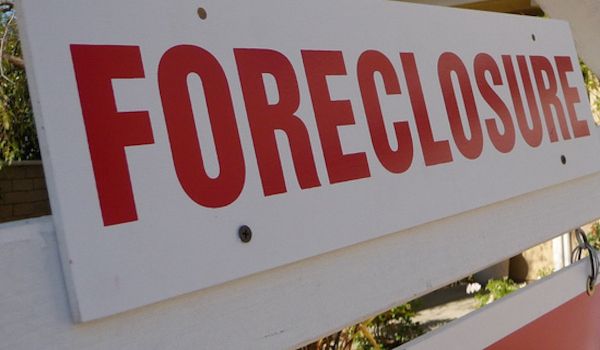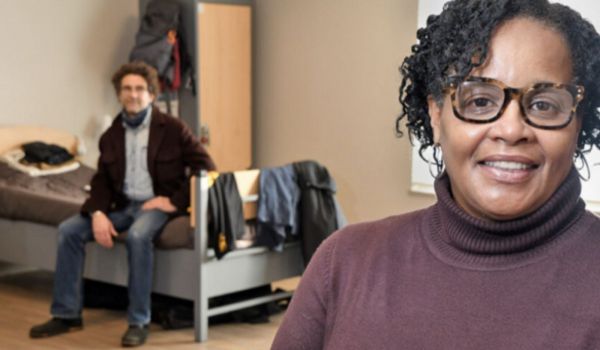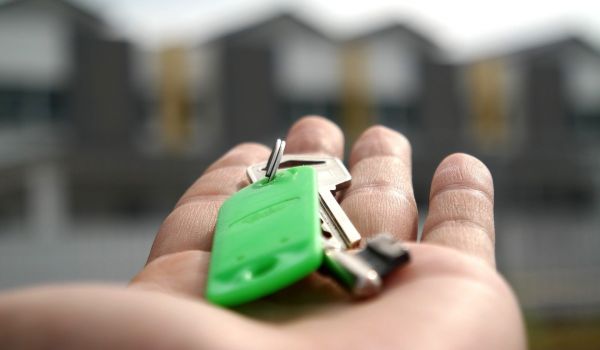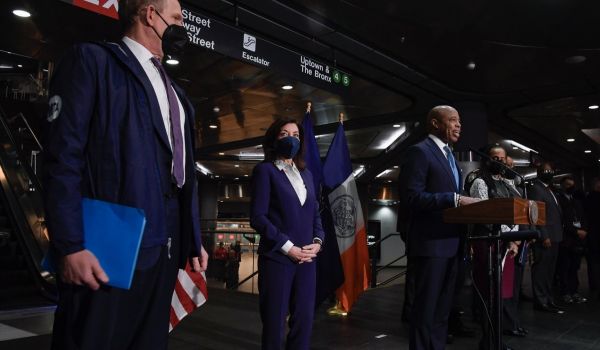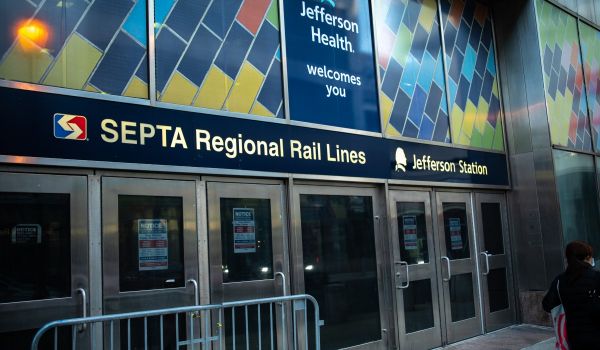Business owners in Portland’s Central East Side were concerned about what they said was an increase in homelessness, trash and biowaste. So they proposed forming an “enhanced services district,” known in other cities as a business improvement district. But when people experiencing homelessness and their advocates saw the district’s proposed budget, they were alarmed — their proposed budget dedicated significant funding to private security, policing homelessness instead of solving it.
“People don’t realize that these things happen because there’s an utter lack of infrastructure — there’s no place to dump household trash and in that 70-city block at that point there were a total of two public bathrooms,” notes Sandra Comstock, a sociologist and advocate for houseless people. She saw a logical alternative to an enhanced services district: Fund a safe space where people could access a hot shower, bathrooms, laundry and basic medical care, as well as dump trash.
To follow through took two years and a complex series of county and city permits, near constant fundraising and COVID-19. By the end of last year, the Hygiene Hub opened beneath the Morrison Bridge with portable toilets and a shower with hot water. This spring, the hub will roll out its clothing and bedding exchange. By late summer, a cadre of nurse volunteers will begin offering a full range of foot and wound care.
The hub is the first major project of Hygiene4All, a nonprofit founded by Comstock that facilitated weekly visioning and design meetings with unsheltered collaborators over the course of 2019 and 2020. “Conversations were about what safety looks like to you and the struggles of meeting hygiene and basic survival needs,” she recalls. “Out of that we designed the four pieces of our [Hygiene Hub] program,” meaning bathrooms, showers, laundry and medical care.
At the hub, attendants keep tabs on separate “pods” within an enclosed site filled with plants and artwork. The shower pod is run by a combination of wind, solar and a generator. A first-aid pod is stocked with topical antibiotics, cold remedies and wound care; attendants also hand out print-outs with tips on foot health, wound care, broken teeth, pandemic safety, bed bug and lice infestations, as well as referrals for other health concerns. Two pods, provided by the Useful Waste Initiative, serve as storage and a sleeping area for the hygiene attendants.

The site plan of the Hub (courtesy Hygiene4All)
By the end of June, the hub will open a clothing and bedding exchange. In Comstock’s weekly visioning meetings, the team discussed how laundering clothing was so logistically challenging — due to cost, access, and waits to use the few facilities available — that unsheltered residents found it easier to throw out clothes and bedding and acquire new ones.
The solution: At the hub, people will exchange dirty and soiled bedding for clean, free replacements. Dirty clothing will be taken off-site to a church to be washed.
While the Hygiene Hub is relatively straightforward, getting it done required significant planning, advocacy and funding. Hygiene4All brought the idea to Portland’s City Council in 2019 and found enough traction that the council granted use of some land owned by the Portland Bureau of Transportation. The land is within the East Side Enhanced Services District, which the city council approved in 2019. The organizers then worked to secure city and county permits to build out the off-grid site.
“The site is unique in that it doesn’t have electric or plumbing,” says Lisa Patterson, the hub’s build out project manager. “We thought of everything as an off-grid effort because of that.” Pre-COVID, the team envisioned an enclosed site, full of greenery and artwork, where people could come, take care of hygiene needs, and simply hang out. “It’s not just a public toilet, it’s not just some huge building and you’re not sure if you’re allowed to go in,” Patterson says.
As they gathered city land use support and raised private funds for the design and buildout, COVID hit. The team halted plans to build the hub and train staff. In the meantime, the city opened three outdoor emergency shelters — which came to be known as the Creating Conscious Communities with People Outside (C3PO) camps — and Hygiene4All dedicated its attention there.
Comstock helped organize two of the self-governed camps, one for LGBTQ people and another for Black, Indigenous and other people of color. It was an opportunity to identify the challenges and opportunities of self-governance within houseless communities — and it dramatically impacted the development of the Hygiene Hub. “We revamped our handbook, our accountability process and all of our trainings based on that five-month, on-the-ground intensive experience,” Comstock says.
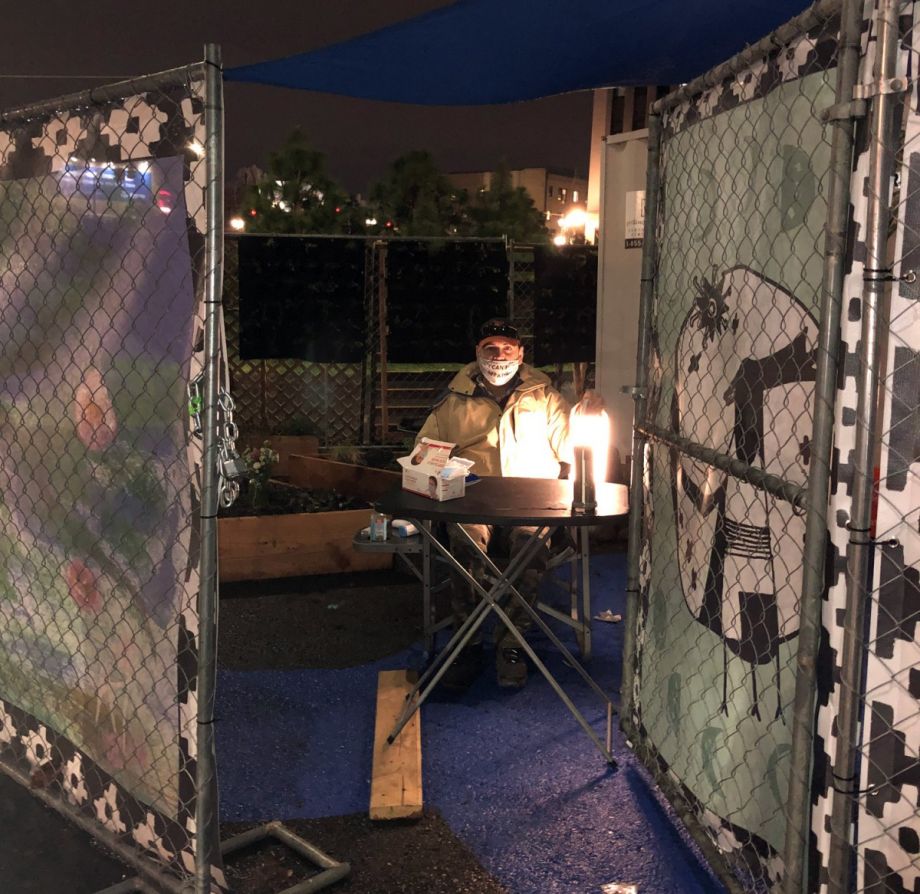
(Photo courtesy Hygiene4All)
Hygiene4All also built much of the Hygiene Hub staff — paid, unhoused or unstably housed people as well as housed volunteers — from its connections within C3PO. The three-month training went beyond site upkeep; it included conversations between housed and unhoused folks around de-escalation, community safety, mental health first aid and “disrupting racist, sexist and anti-queer harm,” according to Comstock.
“There was a lot of community building — in the training we expressed what the focus was, especially for LGTBQ and BIPOC people,” explains Lo Mesidor, who lived in C3PO and became a paid staff member of the hub.
“We have a lot of progressive policies,” says Janessa Farias, a volunteer staff member. “In one of our meetings, we agreed that if someone came into the hub and was having a mental breakdown and being loud, we would allow them to stay as long as they weren’t violent,” she says. “In a lot of spaces, that might not be considered socially acceptable. But the hub feels like a radical space where people really understand each other.”
By Demember, the so-called hygiene attendants formed a tight-knit, collaborative team. “The services are what bring people together, but to me the center of this work is providing a place for healing and for people to feel joyous in doing the work,” Comstock says. Staff work three-hour shifts no more than twice a week, she adds, “so people can show up as their best selves and provide something that people can’t get at other places.”
With the hub up and running, tracking its effectiveness is the next step. “I want to create the data that shows if we spend at the front end, and give people a safe place to be, we’re going to save the city money in the long run,” Comstock explains. “Not just in trash collection but 911 calls and ER visits.” Her goal is to provide a blueprint on reallocating the private and public money spent on policing and serial relocation of homeless individuals.
Hygiene4All is also designed to provide a framework for more collaborations between housed and unhoused neighbors who want to open their own community-based hubs. In the long run, the organization envisions entire “compassionate change districts” (as opposed to enhanced service districts) with equal access to waste, water, sewer, hygiene and sanitation infrastructure currently available only to those able to own or rent housing.
“If we’re going to make further headway, we need to prove that something like this works,” she says of testing the concepts at the hub.
For hub staffer Mesidor, the positive impact is obvious. “I’m a little disappointed because I feel like the city should support it more,” he says. “I’d love to see Hygiene4All as clean, well-known, and global as McDonalds.”

Emily Nonko is a social justice and solutions-oriented reporter based in Brooklyn, New York. She covers a range of topics for Next City, including arts and culture, housing, movement building and transit.
Follow Emily .(JavaScript must be enabled to view this email address)

